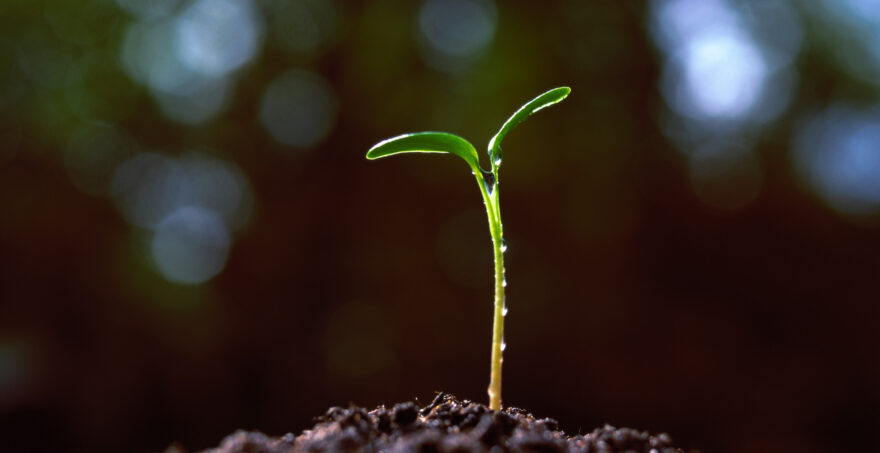The Garden
by Stephanie Calis

Ambitious, and more than a little oblivious, I spent the first warm Saturday of the year intending to pull every. Last. Weed. from my flowerbeds. For hours I bent at the waist, digging and prodding in an attempt to literally uproot everything undesirable on our property.
Two weeks later, my leg muscles finally felt normal again.
My afternoon of weeding yielded more than a typical post-activity soreness: somehow, I overstretched my muscles and actually injured myself. How? It’s not the first, or even second, or third, year my family has planted row after row of flowers to arrange for neighbors and friends. Good sense would suggest I should have an effective approach by now for preparing the beds. I suspect, though, that the Father always has more to teach me about cultivation and growth.
I know I’m not the first to write about gardening as a metaphor for the spiritual life–and that’s probably no coincidence, considering a garden was our first home: “The second account of creation speaks of man being put in the “garden in Eden,” and in this way introduces us to the state of his original happiness,” innocent and free from shame (John Paul II, General Audience, 10 October 1979). Wryly, I wonder to myself if weeds, slugs, and plant diseases only came into existence after the Fall. I do think my recent injury, how I dealt and didn’t deal with it, and my plans for this year’s garden, have illuminated something new to me about our human responses to the Lord’s promptings.
As far as the injury, I tried all sorts of remedies to ease the pain: baths, magnesium supplements, exercise, massage gun. The one remedy I resisted was stretching. It was just too uncomfortable, too painful for too long, to do more than halfheartedly lean into the parts of my body that hurt.
How often do we, in the same way, resist the Lord’s voice instead of leaning into it and listening closer, out of discomfort? Maybe you’re on the precipice of change in your family life, career, or living situation and can’t yet bring yourself to take a step forward. Maybe old or new wounds are on the surface yet too painful to fully confront. We can try addressing or even quieting, His voice with a variety of solutions (the equivalent of my baths, supplements, and everything else) without ever looking squarely at the underlying cause.
I’m reminded that our Father is gentle, but He’s also persistent. Until we welcome Him into our pain, it’s hard to feel true peace. We have a choice with our pain, as well: will we simply endure it for its own sake, or will we let it be redemptive, bringing forth something new and forging healthier, stronger roots?
As my family prepares for planting, I also consider the garden itself, and the spiritual implications of various plants. Bulbs like tulips, for instance, multiply underground each year, but only after a winter’s freeze that signals a new cycle of growth for the spring. Tubers, like dahlias, multiply, too–but they need to be dug up, divided, and stored at the end of each growing season to accommodate temperature sensitivities and avoid overgrowth. If tubers are left to their own devices, over time they produce fewer flowers and become heavy and unwieldy, nearly impossible to pull out of the ground.
These flowers remind me that what we plant and allow to take root in our hearts proliferates, for better or worse. What’s more, planting something once, then walking away, just might not do: consistent growth in the spiritual life takes attention and a certain degree of ruthlessness; a willingness to cut away old growth and allow for new. Today, take stock of your marriage: what habits and pursuits are life-giving, and what might need to be rooted out? What fruits do you hope to yield, in the short and long term?
An old favorite album of mine is Matt Maher’s Alive Again, which concludes with a trio of songs I’ve always believed to be intentionally ordered: first, a meditation on the Crucifixion, “You Were On the Cross;” second, the Easter anthem “Christ is Risen;” and finally, an intimate duet, “Garden,” that describes a heavenly homecoming. A return to Eden as the Lord originally intended it, free from brokenness and sorrow. “What was this thing,” he asks, “they called the fall?”
From the Cross, to the Resurrection, to the heavenly banquet, may we meet the Lord unafraid. May we allow ourselves to be stretched even through hurt, in holy surrender to that which He wants to let grow.





